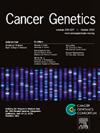Comprehensive molecular profiling in MOTION study
IF 2.1
4区 医学
Q4 GENETICS & HEREDITY
引用次数: 0
Abstract
Introduction
Comprehensive molecular profiling (CMP) and molecularly matched therapy (MMT) have uncertain roles in advanced solid tumors. This study evaluates CMP's real-world application in Russia.
Methods
A retrospective, multicenter study analyzed CMP data from 448 patients with advanced non-hematologic malignancies (2018–2024). Genomic alterations (GA) were classified by ESMO Scale for Clinical Actionability of molecular Targets (ESCAT).
Results
ESCAT tiers included I (15.4 %), II (4.9 %), III (31.5 %), IV (19.6 %), and V/X (28.6 %). Therapy data were available for 374 patients. MMT was recommended for 56.9 % but implemented in only 23.2 % (MMT group, n = 87). MMT group showed better objective response rate (61.3 % vs. 37.1 %, p = 0.001), disease control rate (24.0 % vs. 9.2 %, p = 0.003), and progression-free survival ratio (PFS 2/1) ≥ 1.3 (45.0 % vs. 16.2 %, p < 0.01) compared to non-MMT group (n = 287). Median overall survival (OS) was borderline improved (12 vs. 8 months, HR 0.74, p = 0.06). Reasons for non-MMT management were low GA targetability (40 %), drug unavailability (30 %), clinical decline (23 %), and clinician preference (7 %). Patients with ≤3 prior therapies, ECOG performance status 0–1, and molecular tumor board discussion saw significant OS gains with MMT even for ESCAT III-V GA (5 vs. 18 months, HR 0.25, p < 0.01).
Conclusion
MMT following CMP offers clinical benefit for selected patients, even with ESCAT III-V GA, underscoring its potential in personalized oncology.
运动研究中的综合分子分析
综合分子谱分析(CMP)和分子匹配治疗(MMT)在晚期实体瘤中的作用尚不确定。本研究评估了CMP在俄罗斯的实际应用。方法一项回顾性、多中心研究分析了448例晚期非血液恶性肿瘤患者(2018-2024)的CMP数据。基因组改变(GA)按照ESMO分子靶点临床可操作性量表(ESCAT)进行分类。结果escat分级包括I(15.4%)、II(4.9%)、III(31.5%)、IV(19.6%)和V/X(28.6%)。374例患者的治疗数据可用。MMT推荐率为56.9%,但实施率仅为23.2% (MMT组,n = 87)。MMT组客观有效率(61.3% vs. 37.1%, p = 0.001)、疾病控制率(24.0% vs. 9.2%, p = 0.003)、无进展生存率(PFS 2/1)≥1.3 (45.0% vs. 16.2%, p <;0.01),与非mmt组相比(n = 287)。中位总生存期(OS)有边缘性改善(12个月vs 8个月,HR 0.74, p = 0.06)。非mmt治疗的原因是GA靶向性低(40%),药物不可用(30%),临床衰退(23%)和临床医生偏好(7%)。既往治疗≤3次、ECOG表现状态0-1和分子肿瘤委员会讨论的患者,即使对于ESCAT III-V型GA, MMT也能显著提高OS(5个月vs. 18个月,HR 0.25, p <;0.01)。结论:CMP后mmt治疗可为特定患者提供临床益处,即使是ESCAT III-V GA,强调其在个性化肿瘤学方面的潜力。
本文章由计算机程序翻译,如有差异,请以英文原文为准。
求助全文
约1分钟内获得全文
求助全文
来源期刊

Cancer Genetics
ONCOLOGY-GENETICS & HEREDITY
CiteScore
3.20
自引率
5.30%
发文量
167
审稿时长
27 days
期刊介绍:
The aim of Cancer Genetics is to publish high quality scientific papers on the cellular, genetic and molecular aspects of cancer, including cancer predisposition and clinical diagnostic applications. Specific areas of interest include descriptions of new chromosomal, molecular or epigenetic alterations in benign and malignant diseases; novel laboratory approaches for identification and characterization of chromosomal rearrangements or genomic alterations in cancer cells; correlation of genetic changes with pathology and clinical presentation; and the molecular genetics of cancer predisposition. To reach a basic science and clinical multidisciplinary audience, we welcome original full-length articles, reviews, meeting summaries, brief reports, and letters to the editor.
 求助内容:
求助内容: 应助结果提醒方式:
应助结果提醒方式:


